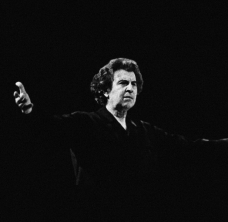The Alternative Stage of the Greek National Opera presents Mikis Theodorakis remarkable work Asikiko Poulaki, with lyrics by Michalis Ganas, as part of the three year tribute cycle to Mikis Theodorakis. The new performance of the work through the eyes of Andreas Katsigiannis, the artistic manager of the Estudiantina of Nea Ionia orchestra, and with soloist Yannis Dionysiou, will be presented on the GNO Alternative Stage at the Stavros Niarchos Foundation Cultural Center on 4 and 5 December 2021. The concert is held as part of the tribute to the bicentennial of the Greek Revolution.
In a new approach to this singular work for the Alternative Stage, Yannis Dionisiou and the Estudiantina of Nea Ionia (a distinguished and internationally recognised traditional orchestra, dedicated to the creative continuity of the eclectic musical tradition of Smyrna) promise a modern and productive reconnection of Theodorakis' inspiration to its traditional, Ionic roots.
This production, part of a tribute to the 2021 bicentennial of the Greek Revolution, is made possible by a grant from the Stavros Niarchos Foundation (SNF) [www.SNF.org]
Among the most interesting and unusual compositions in Mikis Theodorakis' inexhaustible oeuvre, the song cycle with the peculiar title Asikiko Poulaki came into being thanks to the initiative and fertile collaboration of a group of artists (including the guitarist and arranger Yannis Spathas, the singer Vasilis Lekkas and the poet Michalis Ganas) to whom Theodorakis entrusted the first recording of the work, released in 1996.
The cycle Asikiko Poulaki is the climax of the long, though covert, experimentation of the then seventy-year-old Theodorakis with the melodic modes and asymmetrical rhythms of the tradition of Asia Minor. Additionally, it constitutes a belated and moving tribute to the composer's mother, Aspasia Poulaki (whose last name, literally meaning �little bird�, can be found in the work's title), as well as her ancestry (from ?e?me, Asia Minor). Moreover thanks to Michalis Ganas' initiative, the song �The Paths of the Archangel� was added to the cycle, inspired by the composer's autobiography of the same title.
For its part, the term �Asikiko� (from the Turkish word a??k, meaning �lovelorn� as well as �traditional bard�, but whose meaning in Greek is �gallant�, �vigorous�) refers to a composite dance metre, invented by Theodorakis, in which groups of three and two beats (long or short) alternate progressively, in contrast to the symmetrical two-beat metre marking the dance Theodorakis had invented earlier in the past for the film Zorba the Greek, the well-known �Syrtaki�.
Asikiko Poulaki was rearranged and adapted for its presentation on the GNO Alternative Stage by the celebrated and prolific composer and founder of the Estudiantina of Nea Ionia orchestra Andreas Katsigiannis, at the behest of Mikis Theodorakis himself.
With light from the East...
�It was October 2005 when Mikis Theodorakis invited me to his home to propose an idea to me, after having carefully listened to all the recordings released by that time by Estudiantina of Nea Ionia. I distinctly remember this phrase he had told me: 'I want you to reveal the roots of my work Asikiko Poulaki, through the sound of Estudiantina, through Yannis' sound.' Yannis Spathas, this exceptional musician, had orchestrated the first performance of this particular work to lyrics by Michalis Ganas, sang by Vasilis Lekkas. Today, fulfilling Mikis Theodorakis' wish after 16 years, unfortunately under the burden of his absence and the absence of Yannis Spathas, I feel the need, in tribute to their memory, to closely follow these wonderful paths of the Archangel, which have been blazed by Mikis and first trodden by Yannis and Vasilis, and which will now be reilluminated by us�, notes Andreas Katsigiannis.
�
BIOGRAPHICAL NOTES
Mikis Theodorakis Music
Of Cretan descent, born on Chios on 29 July 1925. He lived in many Greek cities to end up in Athens, where he lived ever since. From 1954 to 1960 he worked in Paris and London writing symphonic music, ballets and film music. In 1960 he becomes head of the reformist cultural and political movement in Greece that gives prominence to the synthesis of poetry and music, composing dozens of song cycles, oratorios, revues, music for ancient Greek drama and more. This movement is associated with the progressive political forces of the time, aiming, beyond the democratisation of social life, at a deeper and wider rebirth of the Greek people. This fact often brings him into the spotlight of political life, with the highlight being his active involvement in the resistance movement during the military dictatorship (1967-74). Theodorakis composed music in all genres, though his versatile and rich work extends beyond music in fields such as poetry, prose literature, philosophy and musicology. He even wrote political essays. His first creative period (1940-53) includes songs, oratorios, chamber music, ballets and symphonic works. His most prominent is the First Symphony. The second period, in Paris (1954-59), includes chamber music, ballet and symphonic works. His top work is the ballet Antigone, that was staged at the Royal Opera House (Covent Garden, London) in 1959. His third creative period (1960-80) is dedicated to the art folk music movement, with the most important compositions being the oratorios Axion Esti and Canto General. The fourth period lasts from 1981 to 1988, during which, while always continuing to compose song cycles, Theodorakis returns to symphonic music with major works such as the Third Symphony, the Seventh Symphony, his first opera Kostas Karyotakis (The Metamorphoses of Dionysus) and the ballet Zorba the Greek. Finally, during the fifth period (1989 till his death) he continues creating symphonic works, the most typical of them being his four rhapsodies, but he's mostly involved in the composition of the operas (lyric tragedies, as he calls them) Medea, Electra and Antigone. This trilogy is completed with the opera Lysistrata. With these works Theodorakis inaugurates his lyric period, namely his complete turn to lyricism and the refinement of his lyrical musical expression over the entire spectrum of his musical output. He passed away on 2 September 2021.
�
Michalis Ganas Lyrics
Michalis Ganas was born in Tsamantas, Thesprotia (Greece), in 1944. Since 1962, he has lived and worked in Athens, where he came to study law. He worked as a bookseller for a decade, and later collaborated with state television as a literary broadcaster and screenwriter. Since 1989, he has worked as a copywriter in an advertising company. His poetry has been translated into several languages, and his lyrics set to music by well-known composers: Mikis Theodorakis, Nikos Mamangakis, Nikos Xydakis, Dimitris Papadimitriou, Nikos Kypourgos, Goran Bregović, Ara Dinkjian, etc. He translated Aristophanes' The Clouds for the Greek Art Theatre �Karolos Koun� and Aeschylus' Seven Against Thebes for the Municipal and Regional Theatre of Patras. In 1994, he received the Greek State Literary Award for Best Poetry for his book Paralogi. In December 2011, he received the Poetry Award from the Petros Charis Foundation of the Academy of Athens for his body of work. In 2017, he was awarded a Special Mention from the magazine O Anagnostis for his book Homer's Odyssey (Metaichmio Publications, 2016).
�
�Andreas Katsigiannis Arrangement, santouri
Born in Athens. His involvement in music started at about the age of twelve. He played the santouri live and in the recording studio, and at the same time studied Byzantine music next to the leading protopsaltai Manolis Hatzimarkos and Michalis Meletis. He studied at the Faculty of Theology of the Aristotle University of Thessaloniki. In 1998, he founded the Estoudiantina Neas Ionias, helped and supported by musician friends from the cities of Nea Ionia and Volos. As a santouri soloist he has cooperated with distinguished figures of Greek music in both records and concerts in Greece and abroad. He has composed music for over 15 theatre productions as well as songs in collaboration with top lyricists. He has written music for many documentary films as well as for television productions. He has published three albums with orchestral music and participated in dozens of compilations worldwide.
�
Yannis Dionisiou Vocalist
Born in Limassol. At a very young age he began piano and violin lessons, as well as his engagement in Byzantine music. He is a graduate of the Department of Music Science and Art of the University of Macedonia and holds a master's degree from the National and Kapodistrian University of Athens, specialising in Byzantine music. He teaches courses in folk song at the Department of Music Science and Art of the University of Macedonia. He participates in various musical groups dealing mainly in Greek urban folk music, as well as in the music of the wider Greek area, giving concerts in Greece and abroad. Since 2013, he has participated as a singer in theatre productions at the National Theatre of Northern Greece as well as in private theatres, directed by Sofia Spyratou. Since March 2016, he has taken part in many record albums. His first personal album is expected to be released soon.
�
Estoudiantina Neas Ionias
Estoudiantina Neas Ionias is a revival of a type of orchestra mainly active in the late 19th and early 20th century in Istanbul and Smyrna, and which disappeared after the destruction of the latter. Estoudiantina was founded in 1998 by Andreas Katsigiannis, who serves also as its artistic director. During its trajectory, the orchestra is not content to imitate its models but also, assimilating new elements, it creates and proposes new musical forms in order to attract more and more young people to authentic Greek music, a goal that, after hard work, was achieved in a short time. Since 1999, more than 250 concerts have taken place in Greece and abroad, in the most famous concert venues, with the collaboration of well-known performers, receiving excellent reviews from both the Greek and international press.







 �
�





